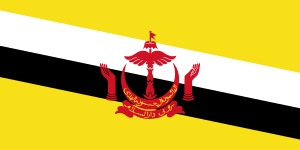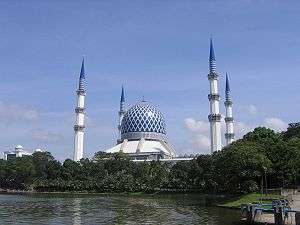Salahuddin of Selangor
| Salahuddin Abdul Aziz Shah | |||||
|---|---|---|---|---|---|
|
12th Yang di-Pertuan Agong of Malaysia Sultan of Selangor | |||||
|
| |||||
| Yang di-Pertuan Agong of Malaysia | |||||
| Reign | 26 April 1999 – 21 November 2001 | ||||
| Installation | 23 September 1999 | ||||
| Predecessor | Jaafar of Negeri Sembilan | ||||
| Successor | Sirajuddin of Perlis | ||||
| Sultan of Selangor | |||||
| Reign | 3 September 1960 – 21 November 2001 | ||||
| Coronation | 28 June 1961 | ||||
| Predecessor | Hisamuddin Alam Shah of Selangor | ||||
| Successor | Sharafuddin Idris Shah of Selangor | ||||
| Born |
8 March 1926 Kuala Langat, Selangor, Federated Malay States, British Malaya | ||||
| Died |
21 November 2001 (aged 75) Kuala Lumpur, Malaysia | ||||
| Burial |
22 November 2001 Royal Mausoleum, Klang | ||||
| Spouse |
Raja Nur Saidatul-Ihsan (div. 1946) Che' Mahiran (div. 1954) Sharifa Salmah (div. 1962) Tengku Ampuan Rahimah (died. 1993) Tuanku Siti Aishah | ||||
| Issue |
Tengku Nor Halija Sultan Sharafuddin Idris Shah Tengku Sofiah Tengku Sulaiman Shah Tengku Zahariah Tengku Fatimah Tengku Abdul Samad Tengku Arafiah Tengku Aishah Tengku Ahmad Shah Tengku Nor Marina Tengku Nor Zehan | ||||
| |||||
| House | Istana Alam Shah | ||||
| Father | Sultan Hisamuddin | ||||
| Mother | Tengku Ampuan Jemaah | ||||
| Religion | Sunni Islam | ||||
Sultan Salahuddin Abdul Aziz Shah Al-Haj Ibni Al-Marhum Sultan Hisamuddin Alam Shah Al-Haj (8 March 1926 – 21 November 2001) was the eleventh Yang di-Pertuan Agong of Malaysia and eighth Sultan of Selangor.[1]
Early life
Born Tengku Abdul Aziz Shah on 8 March 1926 at Istana Bandar Temasya, Kuala Langat, he is the eldest son of Sultan Hisamuddin Alam Shah Al-Haj ibni Almarhum Sultan Alaeddin Sulaiman Shah by his royal consort Tengku Ampuan Raja Jemaah binti Raja Ahmad.
He received his early education at the Pengkalan Batu Malay School in Klang in 1934. In 1936, he furthered his studies at the Malay College Kuala Kangsar until 1941 when World War II began. After World War II, he went to England in 1947 and studied at the School of Oriental and African Studies, University of London for two years.[2]
Upon his return from the United Kingdom, he served with the Civil Service Department as a Trainee Officer with the Selangor Survey Department. He later served as an Inspector of Schools for eight years.[3]
In 1952, he attended a short-term course at the Malay Military Troop in Port Dickson for six months and was commissioned with the Queen Commission in the rank of captain. Thereafter, he was promoted to the rank of major.
Marriages
Sultan Salahuddin Abdul Aziz Shah married at least four wives.
His first wife and cousin, Raja Nur Saidatul Ihsan binti Tengku Bendahara Badar, whom he later divorced, bore:
- Tengku Nor Halija
- Tengku Idris Shah, later Sultan Sharafuddin Idris Shah
- Tengku Puteri Sofiah
- Tengku Panglima Diraja Sulaiman Shah
- Tengku Puteri Zahariah (Ku Yah)
- Tengku Fatimah
- Tengku Panglima Besar Abdul Samad
- Tengku Puteri Arafiah
- Tengku Puteri Aishah
Che Maheram Bt Muhammad Rais, his second wife, bore him:
- Tengku Indera Setia Ahmad Shah
His royal consort, Tengku Ampuan Rahimah binti Sultan Abdul Aziz Shah of the Sultanate of Langkat royal family in Sumatra died in 1993 before his election as Yang di-Pertuan Agong. She was the mother of:
- Tengku Puteri Nor Marina
- Tengku Puteri Nor Zehan
His last wife, commoner Tuanku Siti Aishah binti Abdul Rahman, served as his Raja Permaisuri Agong. Being fifty years younger than him, she was also the youngest ever occupant of that office - only 29 at her succession to the throne.
Hobbies and Interests
Sultan Salahuddin Abdul Aziz Shah was a keen sportsman. His interest in golf is well-known within and outside the country. The Sultan also loved sailing, collecting antique cars, rearing animals and planting orchids. He also likes visiting foreign countries to widen his knowledge and experience.
Sultan
.jpg)
Sultan Salahuddin Abdul Aziz Shah was appointed as the Tengku Laksamana of Selangor on 1 August 1946 and as the Raja Muda (Crown Prince) of Selangor on 13 May 1950.
On the demise of his father, Sultan Hisamuddin Alam Shah Al-Haj ibni Almarhum Sultan Alaeddin Sulaiman Shah, Tengku Abdul Aziz Shah became the eighth Sultan of Selangor with the title Sultan Salahuddin Abdul Aziz Shah on 3 September 1960 and was installed as the 28th Sultan on 28 June 1961.
On 26 April 1984, Sultan Salahuddin Abdul Aziz Shah was appointed as Captain-in-Chief of the Royal Navy by the Malaysian Armed Forces in place of the position of Colonel-in-Chief of the Malaysian Royal Air Force which he held since 1966.
Sultan Salahuddin was the Sultan who signed the cession of Kuala Lumpur from Selangor to the Federal Government to form a Federal Territory on 1 February 1974.[4] The Sultan cried after the signing as he was very fond and proud of the city, but he did it for the greater good of Malaysia. The Kota Darul Ehsan arch was erected along the Federal Highway at the border of Kuala Lumpur and Selangor to commemorate the event in 1981.
Sultan Salahuddin was a founder of Shah Alam, the new Selangor state capital in 1978. He said that for Selangor to become a modern state, it would need a new state capital as Kuala Lumpur had become a Federal Territory. At that time Klang was the state capital after the cession of Kuala Lumpur when the Sultan founded Shah Alam. Many buildings and roads in Shah Alam are named after him.
Salahuddin held the rank of Marshal of the Royal Malaysian Air Force, Field Marshal of the Malaysian Army and Admiral of the Fleet of the Royal Malaysian Navy as per constitutional provisions[5] making him as the second royal military officer to become supreme commander-in-chief of the armed forces.
Yang di-Pertuan Agong
He was the oldest ruler to be elected as the eleventh Yang di-Pertuan Agong on 26 April 1999 and installed on 11 September 1999.
The cession of Putrajaya, which was formerly Selangor territory, to the Federal Government in 2001 to become a Federal Territory occurred during his reign as Yang di-Pertuan Agong. The Persiaran Sultan Salahuddin Abdul Aziz Shah in Putrajaya was named after him.
However, after reigning for two years and 6 months, he died in office on 21 November 2001 at the Gleneagles Intan Medical Centre in Kuala Lumpur. He underwent a heart operation to put a pacemaker two months prior to his death, which he did not fully recover from.[6] He was buried in the Royal Mausoleum near Sultan Sulaiman Mosque in Klang.[7]
Legacy
Several projects and institutions were named after the Sultan, including:
Educational Institutions
- Sekolah Menengah Kebangsaan Sultan Salahuddin Abdul Aziz Shah in Shah Alam
- Sekolah Menengah Kebangsaan Sultan Abdul Aziz Shah in Kajang
- Politeknik Sultan Salahuddin Abdul Aziz Shah in Shah Alam
Buildings
- Sultan Salahuddin Abdul Aziz Shah Building, Selangor's state secretariat building in Shah Alam.
- Sultan Salahuddin Abdul Aziz Shah Mosque, Selangor's state mosque in Shah Alam.
- Sultan Salahuddin Abdul Aziz Shah Court Building, a court building in Shah Alam.
- Sultan Abdul Aziz Shah Jamek Mosque, a mosque in Petaling Jaya old town.
- Sultan Abdul Aziz Shah Airport, an airport in Subang.
- KD Sultan Abdul Aziz Shah TLDM naval base in Pulau Indah, Klang.
- Sultan Salahuddin Abdul Aziz Power Station, a power station in Kapar.
- Sultan Salahuddin Abdul Aziz Shah Arts and Cultural Centre at Universiti Putra Malaysia (UPM) in Serdang, Selangor
Roads and Bridges
- Persiaran Sultan Salahuddin Abdul Aziz Shah, a main thoroughfare in Putrajaya.
- Jalan Sultan Salahuddin and Persiaran Sultan Salahuddin, a major road in Kuala Lumpur
- Jalan Raja Muda Abdul Aziz, a major road in Kuala Lumpur
- Sultan Salahuddin Abdul Aziz Shah Bridge, a bridge in Kuala Selangor.
Others
- Sultan Abdul Aziz Shah Golf Club (KGSAAS), a major golf club in Shah Alam
- Sultan Abdul Aziz Royal Gallery, a royal gallery located in Klang.
Honours
Honours of Selangor
-
 Grand Master of the Royal Family Order of Selangor (since 6 June 1961)
Grand Master of the Royal Family Order of Selangor (since 6 June 1961) -
 Grand Master of the Order of the Crown of Selangor (since 6 June 1961)
Grand Master of the Order of the Crown of Selangor (since 6 June 1961) -
 Grand Master of the Order of Sultan Salahuddin Abdul Aziz Shah (since 30 September 1985)
Grand Master of the Order of Sultan Salahuddin Abdul Aziz Shah (since 30 September 1985)
Honours of Malaysia
-
 Malaysia (as Yang di-Pertuan Agong from 26 April 1999 to 21 November 2001) :
Malaysia (as Yang di-Pertuan Agong from 26 April 1999 to 21 November 2001) :
-
 Grand Master and recipient of the Order of the Royal House of Malaysia (26 April 1999 – 21 November 2001)[8]
Grand Master and recipient of the Order of the Royal House of Malaysia (26 April 1999 – 21 November 2001)[8] -
_-_DMN.svg.png) Grand Master of the Order of the Crown of the Realm (26 April 1999 – 21 November 2001)
Grand Master of the Order of the Crown of the Realm (26 April 1999 – 21 November 2001) -
-_PMN.svg.png) Grand Master of the Order of the Defender of the Realm (26 April 1999 – 21 November 2001)
Grand Master of the Order of the Defender of the Realm (26 April 1999 – 21 November 2001) -
 Grand Master of the Order of Loyalty to the Crown of Malaysia (26 April 1999 – 21 November 2001)
Grand Master of the Order of Loyalty to the Crown of Malaysia (26 April 1999 – 21 November 2001) -
 Grand Master of the Order of Merit of Malaysia (26 April 1999 – 21 November 2001)
Grand Master of the Order of Merit of Malaysia (26 April 1999 – 21 November 2001) -
 Grand Master of the Order for Important Services (Malaysia) (26 April 1999 – 21 November 2001)
Grand Master of the Order for Important Services (Malaysia) (26 April 1999 – 21 November 2001) -
 Grand Master of the Order of the Royal Household of Malaysia (26 April 1999 – 21 November 2001)
Grand Master of the Order of the Royal Household of Malaysia (26 April 1999 – 21 November 2001)
-
Foreign Honours
-
 Brunei : Royal Family Order of the Crown of Brunei (DKMB)
Brunei : Royal Family Order of the Crown of Brunei (DKMB) -
 Bahrain : Al Khalifah Medal Decoration
Bahrain : Al Khalifah Medal Decoration -
 Colombia : Order Of Boyaca Gran Collar
Colombia : Order Of Boyaca Gran Collar -
 Thailand : Knight of the Order of the Rajamitrabhorn
Thailand : Knight of the Order of the Rajamitrabhorn
Notes
- ↑ The Making Of Galeri Diraja Sultan Abdul Aziz, Klang, Pertubuhan Arkitek Malaysia CPD Committee 2007, Laurent Lim Aun Giap
- ↑ Ruler with 'heart of the people', 21 November 2001, BBC News
- ↑ King of Malaysia dies, 21 November 2001, BBC News
- ↑ The Nation Mourns The Passing Of A Great Ruler 24 November 2001, MySinchew.com
- ↑ Alagappa, Coercion and Governance: The Declining Political Role of the Military in Asia, pg 267
- ↑ Malaysian King Aziz Shah dead, Kuala Lumpur, 21 November 2001, The Tribune
- ↑ Thousands mourn Malaysia's king, 22 November 2001, BBC News
- ↑ "Senarai Penuh Penerima Darjah Kebesaran, Bintang dan Pingat Persekutuan Tahun 2001." (PDF).
References
- Alagappa, Muthiah, Coercion and Governance: The Declining Political Role of the Military in Asia, Stanford University Press, 2001, ISBN 0-8047-4227-8
- Information Malaysia, Berita Publications Sdn. Bhd., 1998
- Martin, Frederick, Keltie, John Scott, Renwick, Isaac Parker Anderson, Epstein, Mortimer, Paxton, John, Steinberg, Sigfrid Henry, The Statesman's Year-book: Statistical and Historical Annual of the States of the World for the Year ; 1978-1979, St. Martin's Press, 1978
External links
- Photo Album: Dalam Kenangan, Utusan Malaysia
- Photo Album: Agong sihat di Singapura, 15 October 2001, Utusan Malaysia
| Regnal titles | ||
|---|---|---|
| Preceded by Tuanku Jaafar (Yang di-Pertuan Besar of Negeri Sembilan) |
Yang di-Pertuan Agong (King of Malaysia) 1999–2001 |
Succeeded by Tuanku Syed Sirajuddin (Raja of Perlis) |
| Preceded by Sultan Hisamuddin Alam Shah |
Sultan of Selangor 1960–2001 |
Succeeded by Sultan Sharafuddin Abdul Aziz Shah |
